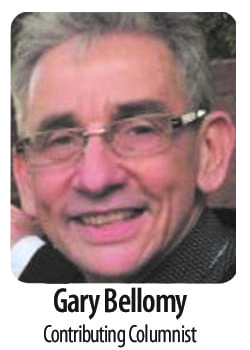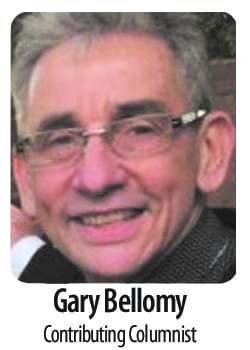Some long-term HIV survivors have thrived; others have not

 I just finished watching the series finale of The Leftovers. I was drawn to this television show for a couple of different reasons. First, as with most every gay man watching, Justin Theroux had my attention with his now legendary jogging scene in his sweatpants (We are so predictable. I can probably lump a majority of the straight, female viewing audience into that equation, too). But beyond that riveting performance, he and the entire cast delivered stellar performances throughout the three-year run of the show.
I just finished watching the series finale of The Leftovers. I was drawn to this television show for a couple of different reasons. First, as with most every gay man watching, Justin Theroux had my attention with his now legendary jogging scene in his sweatpants (We are so predictable. I can probably lump a majority of the straight, female viewing audience into that equation, too). But beyond that riveting performance, he and the entire cast delivered stellar performances throughout the three-year run of the show.
For those of you not familiar with The Leftovers, it was a very dark portrayal what happens in the lives of those people left remaining after a large portion of their loved ones disappear suddenly, in the style of the biblical Rapture. Those remaining are the “leftovers.”
The actual disappearance is the show’s only similarity to the traditional fire and brimstone fairytale. (Spoiler alert: Armageddon never arrives to end the daily suffering of these characters. Instead, they are left to develop some very quirky coping skills to deal with the reality of their loss.)
This scenario, of course, hooked me, because I am a member of the generation of gay men, lesbians, straight allies and family members who endured the loss of so many lives in the 1980s and 1990s. In ways we would rather not admit we are the “leftovers” of the AIDS era.
We survived the devastation and crushing loss AIDS dealt this community. Yes, we have moved on in our lives. Effective drugs for treatment and prevention of new infection has slowed the ravages of HIV. We have learned to live with the gaps left in us where those that perished once dwelt.
But at what cost are we standing here today? Believe me when I say that cost is huge. Parts of us will ever remain broken. And in the quiet, in the still moments, each of us faces this fact.
As for me, I am one of those HIV-positive “leftovers” tagged “long term survivors.” I received my positive test results in 1984. But for reasons unknown, I have managed to live with this virus, experiencing little of its damaging effects for at least 32 years, when so many others did not.
I could say it’s thanks to my healthy diet and exercise, but others with the same type of lifestyle died long ago. Maybe the single most significant factor is I did not rush to begin any of the early drug regimens when they became available. I was skeptical.
I saw too many friends panic when they discovered their status, grasping for any treatment that might save them. Once as healthy as I was, they withered under those treatments.
I have read several articles in recent years about the plight of others like me. And what I’ve read paints a grim picture. They show a group of people lingering outside of society’s norm — unhappy, unhealthy and out of step with the rest of the world.
This is unfortunate. In many instances, these people still cling to their identity as a person living with AIDS rather than seeing themselves as a person with HIV, a manageable chronic condition. Most of them went on disability years ago, abandoning viable careers because they believed their death was imminent. I said at that time that it was a bad idea, and I stand by that assessment today.
Some are facing determination of disability policies when they reach legal retirement age. Many of the men being chronicled would like to return to employment, but their skills are outdated. They’re bored. Often, they live in government-assisted housing that is dangerous and depressing. Others live in housing provided by AIDS assistance organizations where they are reminded daily of the morbidity rate of the HIV-infected. Not the most positive environment in which to dwell.
Collectively, they feel, accurately enough, that the lives they were dealt have been siphoned away in this strange limbo they accepted.
Make no mistake; I am not trying to crow about my superior abilities compared to other “long-term survivors.” I know full well how fortunate I have been with my own health.
As I said, I passed on early HIV medications. But over time I became complacent in monitoring my health. Asymptomatic for so long, I began to feel I was immune. I was foolish. I began drug treatment because a KS (Kaposi sarcoma) lesion developed on the lens of my eye. The drugs at that time were effective in dissolving that growth, and it has never returned. I know I would be dead without these drugs; so would every other person in my situation. The drugs have given many of us the opportunity to survive.
I can’t judge those who have had to live with very real HIV-related illnesses for decades. But it’s not clear that this is what happened with those I read about. Wasting their own lives while chaining themselves to a dead-end disability lifeboat is not their main concern; convincing themselves they are ill and have already lost the battle with HIV is what is lethal.
Many that bought into that toxic mindset perished quickly because of it. Other’s will continue for a spell longer, watching all of life’s meaning fade.
That is what I believe is the true nightmare of this kind of existence. You are setting yourself up to die.
I don’t think this picture of “long-termers” is accurate for a great many of us. It certainly, does not represent my life. Some of us have moved on with the other members of that generation of survivors. We certainly have had unique hurdles to master: decades of high insurance premiums to provide the costly drugs we require, dealing with prejudice concerning HIV in our workplaces and, at times, in our own community.
All of it became manageable somehow because we chose to press on along with the rest of humanity.
Plenty of us have had rich and rewarding lives. We held onto jobs. We stayed active. We risked involvement with new friends and new mates. We allowed others to bring happiness into our lives, and we slowly learned again to reciprocate.
We live in this world. We take what this life offers us today. And it is enough.
We don’t expect what was taken to be returned. We don’t allow the sorrow of the past to take hold of our souls. We make our way. We will continue to contribute. We have chosen to die with our boots on when that day comes. No one is sure how HIV will influence our more senior years. I remain hopeful.
HIV-negative gay men, lesbians and the straight people that supported us then and do so today did not retreat. Many would have liked to, I’m sure. It’s seems unfair that we were given an escape clause that would release us from the burdens life holds, because we owe it to them and to those who did not survive to continually find ways to live productive lives.
If this community can find ways to rehabilitate these men and return them to the light of present day, I will be there to reach out to them as well. We can never give up. HIV did not win the battle; we did.
Gary Bellomy is a longtime Dallas activist working on issues of LGBT equality, HIV/AIDS services and family violence prevention. He is a war resister and a Trump resister.
This article appeared in the Dallas Voice print edition June 16, 2017.

